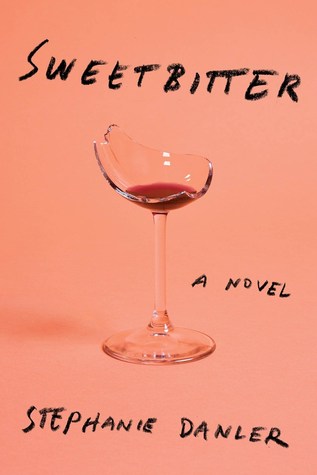You will develop a palate. A palate is a spot on your tongue where you remember. Where you assign words to the textures of taste. Eating becomes a discipline, language-obsessed. You will never simply eat food again.
Sweetbitter is MFA chiclit: Lovely line-by-line writing, demonstrating author Stephanie Danler's educated craftsmanship, but not adding up to much in the end. We have a beautiful young woman, a fresh college grad with a degree in literature, who moves to New York City (because where else is there to go?), and despite no real restaurant experience, she is hired at the best place in Manhattan as a “backwaiter”. Tess is taken under the wing of the most experienced server – Simone, who attempts to train the new girl in food, life, and poetry – and from the first time she sees the beautiful and flawed bartender, Jake, Tess feels a helpless, dangerous attraction. The story is jargon-heavy about the goings-on in a haute cuisine restaurant's kitchen, much is discussed about wines and niche foods, there is sex and drugs and profiteroles, and throughout, New York itself is the most developed character in the story. This really isn't my kind of book: the writing just barely elevates this story above the chic lit likes of Bridget Jones/Sex and the City/The Nanny Diaries, and that writing is so overworked as to have squeezed most of the juices out of the plot. Yet, I can't deny that the word crafting is sensually evocative, so I'll let Danler primarily speak for herself here. On food:
It’s not hard to like these foods once you open your mouth to them: the anchovies, the trotters, the pig’s head terrines, the sardines, the mackerel, the uni, the liver mousses and confits. Once you admit that you want things to taste like more or better versions of themselves – once you commit to flavor as your god – the rest follows. I started adding salt to everything. My tongue grew calloused, overworked. You want the fish to taste like fish, but fish times a thousand. Times a million. Fish on crack. I was lucky I never tried crack.On the guy:
Let me try to say it again: sometimes when he spoke to you he mumbled. You had to lean in to hear what he was saying. He repeated himself often. We were drinking the last quarters of open bottles of Cabernet Franc, and Jake poured them over ice cubes and it tasted like thyme and cranberries, and I said, When do you head home for Thanksgiving? And he said, Soon. I leaned in and said, When? He turned, lined me up in his sights, and said, Soon. I said, nearly falling off my stool, When? We should hang out together before you go, and his arctic eyes said to me, Babe, I've already gone.On food and the guy:
I flipped the shell back. I was prepared for the brininess. For the softness of it. For the rigidity and strangeness of the ritual. Adrenalized, fiercely private. I panted slightly and opened my eyes. Jake was looking at me and said, “They're perfect.”So many writers with MFAs (from Cynthia D’Aprix Sweeney to Gary Shteyngart) seem to set their books in NYC, and it just feels so done to me (how annoyed was I that Tess landed in Brooklyn's Williamsburg neighbourhood? Not the cool end, but still.) So here's a taste of Gotham:
He handed me the beer. It was nearly black, persuasive as chocolate, weighty. The finish was cream, it matched the oyster's creaminess. The sensory conspiracy made the blood rush to my head, made my skin break out in goose bumps. Ignore him. Look away. I looked at him.
“Can I have another?”
• Does anyone come to New York clean? I'm afraid not. But crossing the Hudson I thought of crossing Lethe, milky river of forgetting. I forgot that I had a mother who drove away before I could open my eyes, and a father who moved invisibly through the rooms of our house. I forgot the parade of people in my life as thin as a mesh screens, who couldn't catch whatever it was I wanted to say to them, and I forgot how I drove down dirt roads between desiccated fields, under an oppressive guard of stars, feeling nothing.As Simone pulls out chanterelles and sea urchin, rare vintages of wine and mouldy cheeses, in an effort to train the palate of the unsophisticated new girl, she also tries to give a lesson in terroir – the foody notion that ingredients retain the nature (chalk or brine or peat) of the region from where they were harvested – and there's a brief discussion of whether people also have terroir. And while this could have been a meaningful philosophical tie-in between the restaurant and Tess' rural history, it's ultimately left on the table; perhaps the point is that the story is taking place in NYC; stew pot as metaphor for melting pot. And again: the writing is good here, but in the end little one, it's just dinner.
• Jake put on a new record and propped the cover up – Charlie Parker’s sax ran into the room. Someone had told me that when he soloed he referred to the melody only by omission – he implied it. It sounded exactly like New York was supposed to sound.
• We always just miss New York. I watched it with this neighborhood. When I moved here everyone was mourning the SoHo of the seventies, Tribeca of the eighties, and already ringing the death knell for the East Village. Now people romanticize the Alphabet City of Jonathan Larson. We all walk in a cloud of mourning for the New York that just disappeared.

